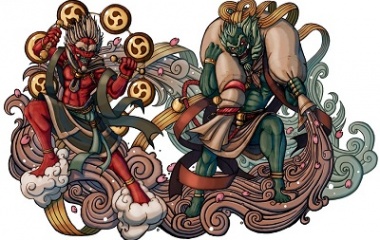- Pronunciation: Rye-Gin
- Other Names: Kaminari-sama, Raiden-sama, Narukami
- Parents: Izanami & Izanagi
- Powers: Control of thunder and lightning
Raijin is one of the most important gods in Japanese mythology and one scary-looking guy. Along with his brother Fujin (the god of wind) Raijin is pretty much responsible for all the bad weather that hits Japan and, as a series of islands, Japan gets a LOT of bad weather.
You’ll find terrifying statues of Raijin all over Japan and no matter where you go you’ll eventually have to walk under his intense gaze. The popularity and widespread depiction of this thunder god is a sure sign of the respect these islander people have for stormy weather.
Who is Raijin?
Raijin is one of the eldest gods among all Shinto gods. Shinto is the most dominant religion in Japan today, followed by Buddhism, with many gods representing the different forces of nature and existence.
Raijin is the direct offspring of Izanagi and Izanami, the two gods who descended from heaven to create the islands of Japan.
Appearance
Every Japanese person knows what Raijin is supposed to look like, since there are statues and pictures of him all over Japan. He is usually depicted as a big, muscular figure (although sculptors do like to give him a potbelly) with a terrifying face. Sometimes he has horns, while other times he simply has wild, gravity-defying hair.
Many images of Raijin show him with three fingers on each hand. The three fingers represent the past, present and future respectively. Sometimes he is shown with red skin, but this varies. However he is shown, there is no mistaking his demonic appearance. Of course, he looks similar to his brother Fujin, but you can easily tell them apart, since Fujin always carries a bag of wind with him.
Raijin would not look out of place on the cover of a heavy metal album, so it’s appropriate that we see often him represented holding hammers and surrounded by drums. After all, he has to make thunder somehow.
In some parts of Japan, he is known as Raiden and is shown simply as a robed man with a straw hat.
Raijin’s Family
This thunderous god is the son of Izanami and Izanagi, the two principal gods of Shinto. Raijin has innumerable brothers and sisters, as all the Kami in Japan descend one way or another from Izanami and Izanagi. However, his rivalry with his brother Fujin as they battle for rulership of the sky is legendary.
History
This thunder god shares a history closely tied to that of his parents, Izanagi and Izanami. Raijin is one of the many gods born from these two deities after they created Japan.
He was born following his mother Izanami’s death, caused by the birth of the fire god. After she went to the underworld, her husband Izanagi went after her. After a misunderstanding between the two, Izanagi fled and Raijin was one of the spirits Izanami sent to chase him and bring him back.
He is one of the kami that also represents one of the islands of Japan and is thought to reside there in the mountains.
He and his brother Fujin duel constantly to determine who the true ruler of the skies is.
While he is widely respected, feared and seen as an Oni, or demon, the Japanese see Raijin as a good spirit. Based on an old belief that lightning fertilizes crops, this thunder god is also a god of agriculture to whom farmers pray.
Origin
The island nation of Japan has had more than its fair share of typhoons and severe storms to solidly cement a deep respect for bad weather in the minds of the Japanese people. The Shinto religion is strongly based on the idea that everything we see in nature has a spirit or kami. There are a great many kami in Japanese mythology, but understandably the awesome natural forces of storms would lead the Japanese to believe that a particular important kami was behind them.
As with most of the kami, what we know about Raijin comes mainly from an ancient Japanese text known as the Kojiki.
The existence of thunder gods in various belief systems is very common, especially among islander people, and you’ll find a long list of them across different cultures.
Raijin is an important part of Japanese life and culture as the people of Japan still live with the reality of storms, just as they have always done.
Raijin is both feared and admired by the Japanese. He can be a mischievous god, but he is also an essential part of nature. Mothers warn their children to cover their belly buttons during storms or else Raijin may steal them away and eat their bellies.
When the Mongols under Kublai Khan tried to invade Japan in 1274 and 1281, they were blown back by typhoons both times. The Mongols never tried to invade Japan again.
These seemingly miraculous storms that came just at the right time have been credited to Raijin, who is said to have acted to protect Japan. After all, Japan was created by his mother and father, and the islands themselves are Kami and therefore his brothers and sisters. The people of Japan are his father’s creations as well.
Raijin and Fujin are also protectors of temples and other holy places, which is why their statues often are placed at the gates to such buildings.
Modern Influence
Raijin features in many video games and Japanese cartoons. The cultural influence has also had a notable effect in the West, with video games, films and other media depicting characters that are clearly inspired by Raijin. He is still highly relevant to modern Japanese culture, and of course people spare him a thought every time another storm rolls through Japan.











It’s true if you believe in it but I have no problem believing all Gods exist
Fujin is depicted with a large bag or sack on his back due to him being the God of the winds in the Shinto religion
Can you include where he lives, i’m doing a project on mythology and it requires me to know where the god or goddess lives, yet everywhere I look it seems to be exceptionally difficult. thx
i would like to know how recent this information is
Dear sir,
Why has ( sometimes ) Raijin a tobacco pouch on his back ?
Best regards,
Jan Foppe Hubee